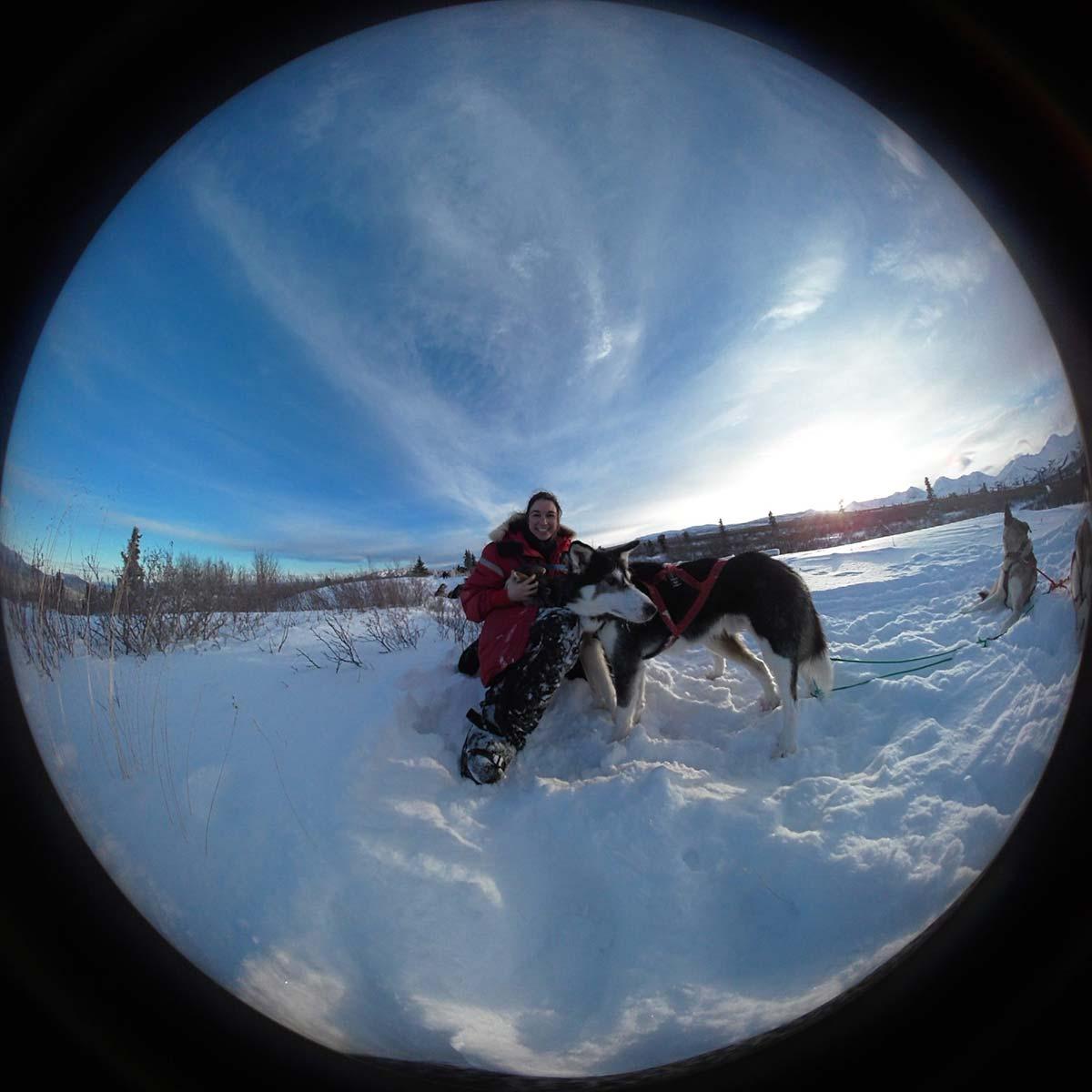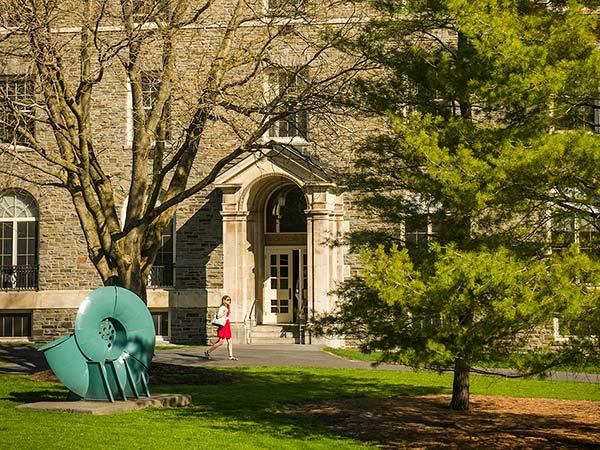Scholars in the AMS program may apply for grants totaling up to $10,000 to fund academic experiences throughout their time at Colgate.
Finding an Opportunity
Scholars in the program submit proposals to fund experiences ranging from independent research to academic and professional conferences of interest.
Students seeking ideas for using their AMS funding may:
- Review past AMS project experiences.
- Consider favorite academic subjects. Is there anything learned in the classroom that would be interesting to explore first-hand?
- When reading for class, do you leave with unanswered questions? What experience might be planned to answer those questions?
- Brainstorm with peers, inside and outside the AMS program. Chatting with roommates, parents, and friends may inspire new ideas, or refine your initial thoughts.
- Schedule meetings with professors in fields of interest. They may have ideas, existing projects, or contacts you find useful.
Don't dismiss any ideas as unrealistic or impossible. Write them all down.
As an idea starts to take shape, some early planning steps students can take include:
- Research the topic area. Consult with disciplinary expert and academic sources, as well as popular media that exists about the subject.
- Research the location for the experience. Are there special clearances or requirements concerning what you wish to do in that country or region?
- Begin notes outlining the project:
- List project goals
- List your own relevant experiences and knowledge (courses taken, language skills, etc.)
- Write a sentence or two about the potential impact of the experience on your academic goals.
- Discuss with professors, the AMS directors, and peers. Be open to the advice they share and learn from their experiences.
- Approach a professor to ask if they will be your mentor for the experience, are willing to serve as an academic reference, and assist as you prepare and complete a proposal.
- Determine the scope of your project. Be realistic and focus on something that can be done well with the existing time and budgetary constraints.
Preparing a Proposal
A proposal for AMS funding has these distinct sections:
A project proposal document is where scholars describe their proposed project and experiences, as well as their academic merits.
Independent Research Proposals
Typically, independent research proposals are:
- 5-6 pages long
- Double-spaced
Other Project/Experience Proposals
Proposals for other projects may be less formal than for independent research projects; however, they should still clearly explain the motivation for the project, how it supports the student’s academic goals, and the activities and experiences being proposed.
An itinerary serves as the timeline for your project, from start to finish, describing what you will be doing and when you will be doing it. It should include all of your major plans for each day.
While this can take different forms depending on the kind of project that you do—for example, an independent project will differ considerably from participating in a conference—it should fully detail the length of your trip, the different milestones you need to achieve in order to satisfy the objectives in your proposal, and serve as a feasible roadmap for gauging the practicality of your overall project.
Proposals should include a detailed document regarding the budget of the planned experience. This should include information regarding how the budget was calculated and what resources informed any estimates (e.g. Travelocity, AAA, Student Universe).
Do not overbudget, as requests deemed to be excessive will require revision, which may delay the disbursement of grant funds.
The final budget document will be uploaded via the regular application form.
Use the sample budget below as a guide:
Elements of a Formal Proposal
The abstract should provide a concise summary of the project — a "big picture" overview. Begin with a brief contextualization, then explain how the project will expand, redirect, or otherwise advance current discourse within a given academic discipline.
In this section, you must provide details about your project: the who, what, where, when, and why. Aim to address each of the following:
- What do you plan to do?
- What are the primary research questions your project will answer?
- Why is your project important?
- Where your project will take place? Why there?
- What are the sites and facilities you plan to visit — including information about any formal approval you will need in order to visit?
- Who you will speak and interact with?
- Be prepared to answer the "so what?" question and explain the significance of what you plan to do.
You should also detail the qualifications and background you bring to this project. Make sure to identify specific skills, experience, knowledge, and interests that will enable you to see it through to completion.
In this section, you should describe how you will complete your research. Detail specific theoretical approaches and disciplinary methodologies you will utilize and identify equipment and supplies you will need.
Keep in mind a few questions as you write:
- How does your work satisfy the academic goals of your project?
- What disciplinary methods are you drawing from?
- What theoretical approaches inform your research?
- What activities will help you to find answers?
- What are the concrete tasks you need to accomplish? Will you administer questionnaires, conduct quantitative measurements, take photographs and video, search archives, or some mixture of these?
Keep in mind: if your research involves human subjects, you might need approval from the Institutional Review Board.
Use this section to demonstrate your grasp of appropriate resources. An annotated bibliography is much like a regular bibliography but includes a few descriptive sentences beneath each entry, explaining its relevance to your work. Limit this to compelling and foundational resources only.
Your annotated bibliography must conform to APA, Chicago, or another commonly accepted style guide for your discipline.
Travel, health, and safety factors must be addressed, even if a country is not on the warning or alert list, and even if the project will be conducted in the United States. This section should therefore include detailed information on:
- Transportation
- Phone communication access
- Emergency plans
- Medical resources
- Pre-departure vaccinations
- Medications
If your proposal involves a country with a Department of State Warning or Alert, you must explain how you plan to incorporate necessary safety and security precautions. You can find a current list of warnings and alerts from the Department of State. Depending on the specific nature of the warning, you may also need to submit information according to Colgate's Travel Warning Policy. All proposals that concern travel outside of the country are subject to review by Colgate's risk managers.
Keep in mind that a country may not have an official travel warning, yet "significant risks" may be described within Country-Specific Information Sheets and Travel Alerts. You must be prepared to address these concerns on your itinerary, in your timeline, and in greater detail in this section of your proposal.
Describe what you will do with the information you obtain from your project. Will you:
- Post on the AMS blog? (required)
- Give a presentation at the Scholars Symposium? (required)
- Write an article for a peer-reviewed journal?
- Make a video or multimedia project for social media?
- Engage in activism or campign for reform?
- Use it as a basis for a larger honors thesis or fellowship project?
AMS grant applications require a minimum of two faculty to serve as academic references. They will be contacted and consulted if there are any doubts about your ability to effectively complete your project.
In selecting your references, you may wish to consider: What is your relationship to these professors? Is one of them your academic adviser? What is their involvement with your proposal? How will they help you successfully accomplish this project?
Please provide a statement indicating whether a part or all of the proposal is being submitted for any other research funding at Colgate or elsewhere.
Submit a Proposal
Selection Criteria and Restrictions
Students may receive more than one AMS grant during their time at Colgate, but combined proposals may not exceed $10,000. Proposals may be submitted for independent research, academic programs, conference attendance, faculty-led research, and internships.
All proposals should clearly articulate how the funding will be used to augment a particular academic goal.
Proposals may be submitted for any of the following experiences, but all proposals must clearly further academic goals:
- Initiating independent studies or research in an area of particular interest, including research-related or academically meaningful internships or experiences
- Extending academic work in any one of a number of ways outside the formal curriculum and programs of the college
- Supporting attendance at a relevant academic conference
- Supporting living expenses while researching off campus
- Supporting travel and research costs for independent projects
While many items will be considered, AMS grants cannot be used:
- To cover costs that would be funded through the regular channels of Colgate financial aid or programmatic funding, like Study Groups and Extended Studies
- To pay for skills training seminars or vocational programs
- To support test preparation courses or fees or pre-professional exams
- For coursework at another institution, university, or academic program
- To support projects that directly receive Colgate credit. For example, the funds cannot be used for regular expenses incurred by students participating in a Colgate study group
- For projects without academic merit, like those doubling as paid vacations and oceanic cruises
- Any projects that involve the consumption of alcohol or use of illegal drugs

